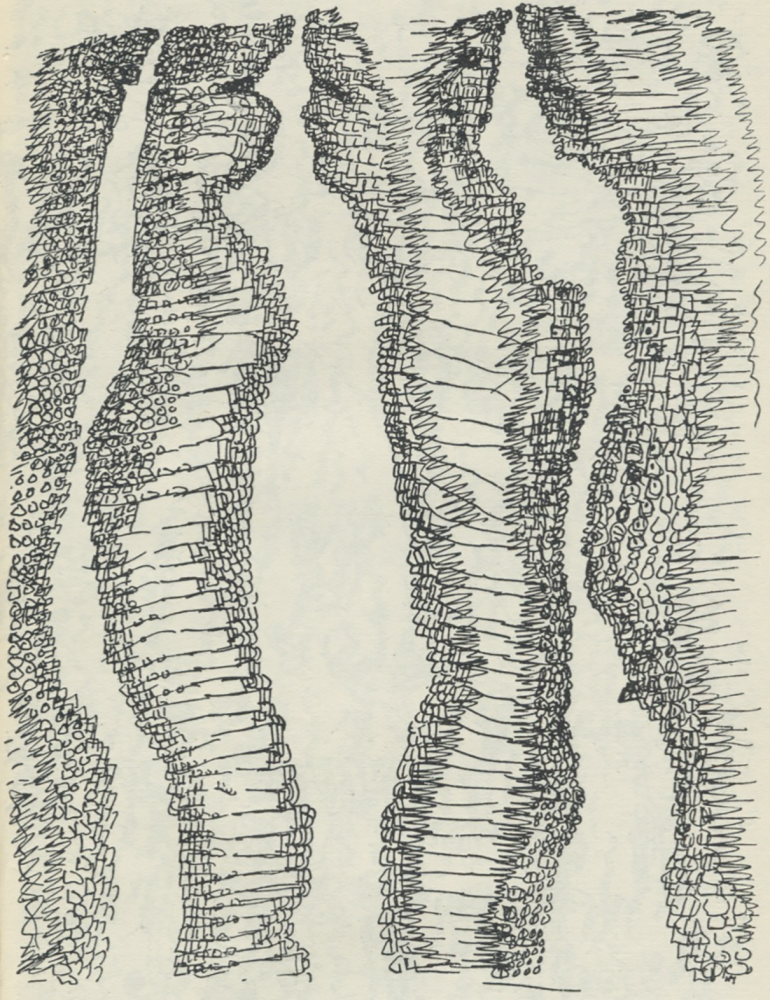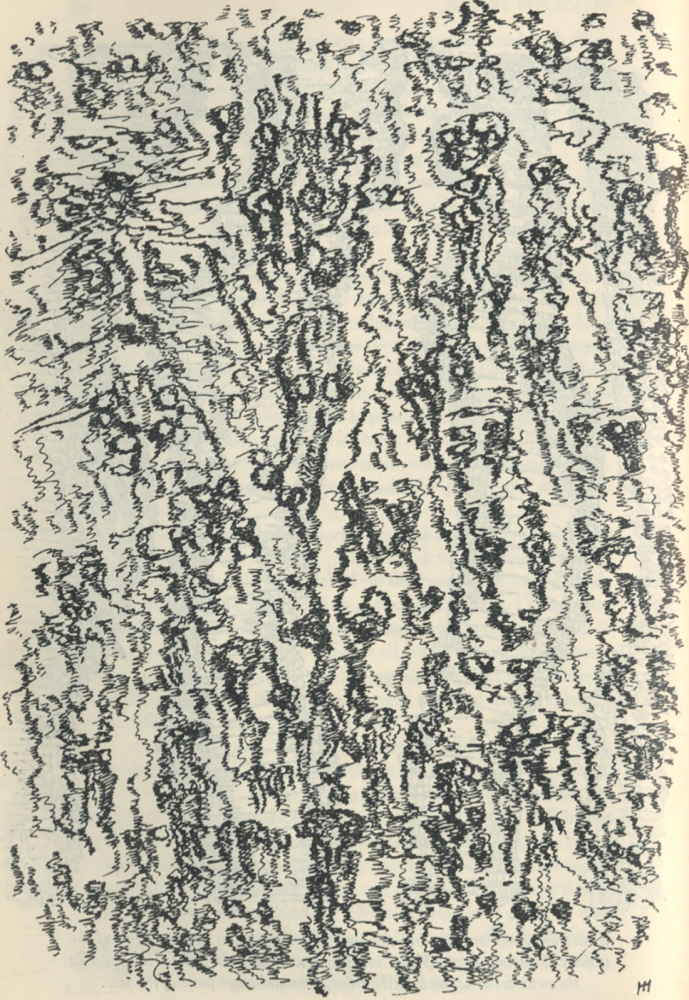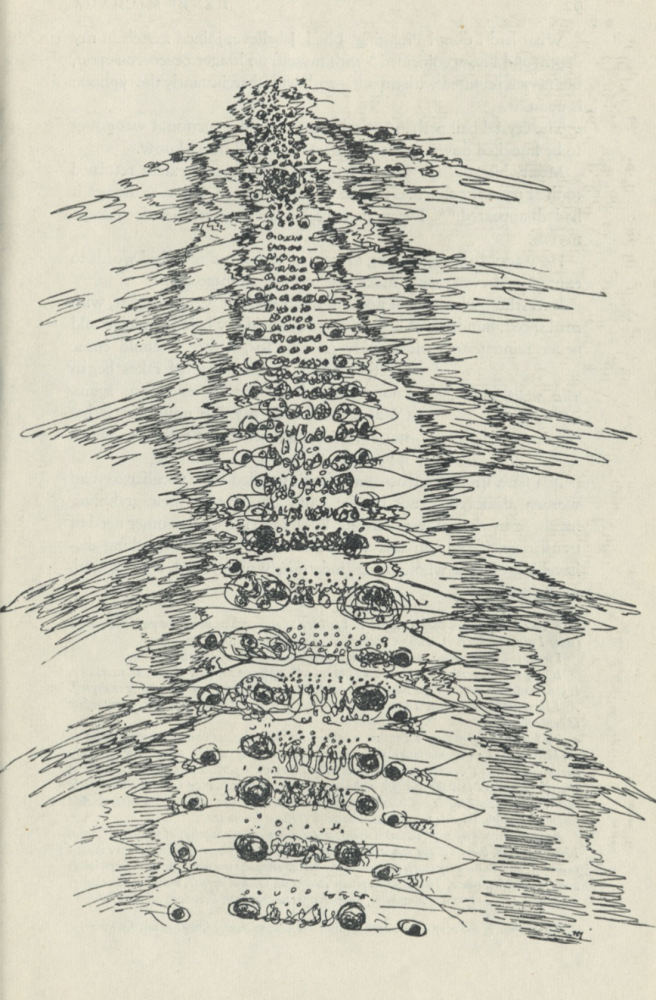Issue 15, Winter 1956
Henri Michaux, the famous French poet and painter, has long been interested in the effects of mescaline, the drug derived from the Peyotl cactus which traditionally has been taken by the Indians of Mexico and the American Southwest to induce ecstatic religious visions. More recently it has attracted the interest of psychologists investigating the physical roots of mental disorder and of Aldous Huxley who describes his experiences with it in The Doors of Perception.
“I first took mescaline,” Michaux has said, “to see if I was capable of having luminous and colorful visions. I considered myself a kind of cripple: all my dreams and inner mental images are in dull grey.” But after a few minutes under the drug he decided that the search for luminous images was secondary to the possibilities of the drug for exploring the mind itself. “What immediately interested me,” he says, “was the rapport between the image and the idea, between the wish to see something and what one sees. In mescaline one finds an independent consciousness with its own world of images. One learns what it is both to have and not have a will.’’
Over a period of six months starting in January 1955, Michaux, a small and delicate looking man in his fifties, took the drug four times. Lying in a darkened room in his flat in a fine old hotel particulier on the rue Seguier, he scribbled jagged little notes of his impressions. Unlike Huxley he found that the most striking effects were not profound transformations of external objects but rather the inner visions which poured through his mind like a weirdly agitated and vibrating film, often seeming to possess his whole being. During the first three experiments, scenes of incredibly high and numerous buildings and of tropical oceans would be followed by pure and intense colors—an absolute and maddening white, an enveloping green. Constantly changing and vibrating compositions of lines, geometric forms, and colors would appear, repeat themselves, and then evolve symmetrically into new patterns, sometimes engulfing his consciousness to the point where he felt himself a part of the vision. “Je suis composé d’alveoles dc vert... ,” he wrote during the first experiment, “je me termine en vert.” Describing a later vision of being caught in fluid pouring through an endless furrow, he wrote, “Moi-meme, j’étais torrent, j’étais noyé, j’étais navigation.” Floods of contradictory, urgent, and often upsetting impulses would seize him: for instance, to telephone someone, then not to; or, to enumerate dozens of words ending in able. In another phase of the drug, grotesque tableaux would appear. Some 50 trumpeters ridiculously dressed in blue and rose would be seen playing to an audience half as large as the town of Orleans, looked down on from 40 tiers of balconies.
In June, taking the drug for the fourth time, he accidentally mixed a dose six times the usual strength. The record of this experience which appears below is taken from the final chapter, entitled Schizophrenie Experimentale, of Misérable Miracle, Michaux’s book on mescaline published in France last year.
Along with the text are six previously unpublished drawings of the visions produced by the drug. These were not made while undergoing the full effects but immediately afterward. “It is impossible to think of moving the hand to draw while in the shock phase,” Michaux says, “but the vibrations persist for weeks.” An abstemious man who usually takes no coffee, tea, tobacco or liquor, and very little wine, Michaux is now finished with his mescaline experiments. He did not find them pleasant. “After a while the effects of the drug, at least for me, are terribly fatiguing and enervating,” he said recently, “and for a complex man who has within him contradictory tendencies and urges, each experiment can be a severe test.”
—R. B. S.
* * *
Through an error of calculation, I swallowed six times what is for me a sufficient dose. I was not aware of it at once. Eyes closed, I watched in myself, as on a screen or a ship’s log, the colors and the lines, this time gigantic, of Mescaline appearing in my inner vision, and the agitation of the images, always so amazing. Then suddenly, nothing any longer. I saw nothing. I had slipped down to some bottom. A door, open till now, had suddenly closed in absolute silence.
What is it? What has happened? Taken by surprise, the general staff loses sight of its troops. More defenseless than a cork dancing on rough waters, more vulnerable than a little boy advancing against a column of tanks debouching onto the road.
The waves of the mescalinian ocean had broken over me, buffeting me, tumbling and tossing me like grains of sand: The movements, which till now had been in my vision, were on top of me. It had not lasted more than ten seconds and it was done. I was lost.
But just a minute. Let’s not be in such a hurry. The torture is going to last for hours. It has not even begun. It is half-past one. I am not yet aware that I am about to come to grips with the mind’s severest test.
Innocent, like a tourist, I watch the first changes. Calmly, I observe the queer internal tremblings which I know already, which I recognize. I notice the beginnings of the shreddings I am probably soon going to see, the horses’ mouth sensation, and that over by the window, with curtains only partly drawn, great dazzling white sheets seem to be fluttering.
In my chest there is a deeper respiration, prelude to a different kind of “attention.”
Lines, more and more lines, which I am not sure I really see, though already distinct and fine (which I feel?) which I begin to see (how tenuous they are this time!) and how ample their curves, so very ample! I notice that at moments they disappear and again their amplitude, really extraordinary compared with their thinness, and I know that the color white, which I am soon going to see, will be slightly violet, though I can still see nothing but the light, light gray of the spidery threads which boldly, rhythmically, incessantly stride over empty space.
Really enormous the amplitude of the sinuosities, and so very fine the lines, which could nevertheless step over houses. Something that has never been seen before! I feel like telephoning B. to tell him about this formidable sight. I give up the idea for fear of interrupting for too long this extraordinary hour. Then this thought of telephoning, this thought of hardly more than a dozen seconds ago, begins to recede, quickly and gravely, taking on at the same time an extreme importance, like the last traveler on the station platform in your native city as you are leaving, whom you see from the train which is imperturbably, irrevocably starting to move. Such is this progressive moving away. It is still there, the thought, like an echo, as though it were at the other end of the nave of a great silent church (that of time) and would send back to me not the sound but the “wave of presence.” Thus it “echoed,” so to speak, in the silence, this idea which had gone, but which is now inside the great church. Strangely enough I was delighted to be the only one to know that I had had this thought, so ordinary in other respects, but rendered peculiarly majestic, imperial by its resonance.1
Enormous Z’s are passing through me (stripes-vibrations-zig-zags?). Then, either broken S’s, or what may be their halves, incomplete O’s, a little like giant eggshells a child has tried to draw without ever succeeding.
These shapes, like an egg or an S, begin to disturb my thoughts as if they partook of the same nature.
I have once more become a passage, a passage in time. So this, then, was the furrow with the fluid in it, absolutely devoid of viscosity, and that is how I pass from second 51 to second 52, to second 53, then to second 54 and so on. It is my passage forward.
Anesthetized to the world that is in possession of my body, and to everything that only an hour ago was continually filling it, I feel nothing now but the front. I am all prow.
From time to time I encounter a crossroads of irritations, a terrace filled with the insufferable winds of the mind, and I begin to write, almost without knowing, without thinking, intent on the transmission, these words whose significance, great as it is, I fail to recognize: “Too much! Too much! You are giving me too much!”
The lines follow each other almost without stopping. Faces slide over them, outlines of faces (usually in profile) are caught in the moving line, are stretched and contorted like the heads of aviators subjected to too much pressure that kneads their cheeks and foreheads like rubber. Much more linear these faces, less terrible, simply grotesque. What becomes disturbing is their size, the size of cliffs, which together with the sinusoidal lines that carry them, it keeps on increasing.
Except for the grotesque faces senselessly laughing (or was it a sign of my situation, which I failed to understand?), nothing.
These are the only ships carried, not on, but inside these enormous waves.
How huge a thing can be! There is something prodigiously exaggerated about all this though it does not in the least modify the grotesque character of the heads, which are even ornamented with silver gray pearls, some with a bluish tinge, and, I must say, delicate in startling contrast to such hyperbolical lines.
For an instant they leave me. A something, I don’t know what, descends into a vertiginous gutter. But it doesn’t last, and they return, the lines, the lines, the diabolical, dislocating lines.
My head, meanwhile, more and more insensible, like cardboard, I rub with and inside a shawl, rub it mechanically, furiously, the only living zone of my being, all that I have left, my homeland that keeps shrinking more and more.
And the lines, the dislocating lines seem to me more gigantic than ever. I have to force myself not to have recourse to sugar, which is supposed to be an antidote. Nevertheless, almost mechanically, I begin to eat a few sections of orange. For there is something suspect about these lines that are growing, these lines that are becoming cliffs, that keep stretching the faces interminably, though my consciousness of the fact, which I jot down, is still kept at a distance by my notation.
And they are still growing, the lines. I wouldn’t know how to draw them even vaguely, the paper is no longer on the same scale. I pause, put down my pencil, push aside the paper, and decide to try something else.
People had told me about visions in crystal balls. (But I must have misunderstood them, thinking that I could transfer the visions in my head to the crystal.) So I picked up the crystal ball, ready beside me. I turned it round and round in my hands, at a loss, I remember, like a child with a new object, not knowing what to do with it or whether it is worth bothering about at all, and ready to put it down. That is what I was about to do, having already held it in three or four different positions and only barely seen my own fingers enlarged by the refraction, when...I WENT UNDER.
The submergence was instantaneous. I closed my eyes to recover my visions but, as I realized, it was no use, it was over. I had cut off that circuit. Lost at an amazing depth, I was no longer moving. Still in this stupor, several seconds elapsed. And, suddenly, the innumerable waves of the mescalinian ocean came pouring over me and knocked me down. Kept knocking me down, knocking me down, knocking me down, knocking me down, knocking me down. It was never going to end, never. I was alone in the vibration of this wreckage, without periphery, without annex, a man-target without hope of return.

In the drawings on this and the two following pages appear some of the visions of human faces. Above are profiles. Contorted full faces appear in the next drawing, and, in the third, eyes and other parts of the face.


What had I done? Plunging, I had, I believe, joined myself in my depths and I now coincided2 with myself, no longer observer-voyeur, but myself reunited with myself—and, with that, instantly the typhoon is upon us.
The crystal ball perhaps only hastened my destruction. I was going to be knocked down anyway. Or was I? I shall never know.
Meanwhile outside objects had to a considerable extent returned to their natural colors. As for the visual excitation, it was as though it had disappeared.3 Everything had been restored to order except myself.
How agonizing, agonizing in essence, it was I cannot find words to express, and even trying makes me feel like an imposter.
It was there where one is nothing but oneself, it was there that, with mad speed, hundreds of lines of force combed my being, which could never reintegrate itself quickly enough for, before it could come together again, another line of rakes began raking it, and then again, and then again. (Will it go on all my life now that it has started, now that I am in the path over which it passes?)
In a flash I recalled that strangely dishevelled look peculiar to mad women, dishevelled, not by the wind alone or by their grabbling hands, or by their slovenly habits, but by the imperative inner need of translating, if only in this way, the swift diabolical combing-dishevelling of their whole being, indefinitely martyrized, criss-crossed, wire-drawn.
In the same way, and always at this incessant, inhuman speed, I was beset, pierced by the electric mole boring its way through the essence of the most personal part of myself.
Caught, not by anything human, but in a frenzied mechanical agitator, a kneader-crusher-crumbler, treated like metal in a steelmill, like water in a turbine, like wind in a blower, like a root in an automatic fibre-shredder, like iron in the tireless motion of a milling machine cutting gear teeth. But in my case I was besides forced to look on!
Like a bird in the eddy of the propeller of a four-engine plane, like an ant pinned under the crushing waters of a flood gate, like nothing I can think of, like nobody.
Intense beyond intensity, this struggle, and I active as never before in my life, miraculously surpassing myself, but surpassed out of all proportion by the dislocating phenomenon.
The horror of it was that I was nothing but a line. In normal life one is a sphere, a sphere that surveys panoramas. In no time one is in a castle, one is constantly going from one castle to another, such is the life of even the poorest man who is mentally sound.
Now only a line. A line that breaks up into a thousand aberrations. The whiplash of an infuriated carter would have been a relief to me. And no pity either. I, this accelerated line I had become, did not retreat, withstood each new slashing, was ready to form again, was on the point of forming again when the force, swifter than a meteor, falling upon it... It was agonizing because I resisted.
What of emotion? I could not even retreat into emotion. The natural diffusion of the emotions that go straight to the heart, making it beat more rapidly or more slowly, as well as to the lungs, changing their respiration, did not take place. This was brought home to me ten days later when at a moving picture theatre, watching a typical movie drama, I felt an emotion “pierce my heart”. In my days of horror I had forgotten this path, this comfort.
* * *
To have become a line was a catastrophy, but, even more, it was a surprise, a prodigy. All of me had to pass along this line. And with the most appalling jolts.
The metaphysical taken over by the mechanical.
Forced to pass over the same path, myself, my thought, and the vibration.
Myself only a thought, not the thought become myself, or developing in me, but myself contracted to the thought.
At the same time came the dislocating vibration which “rejected” the thought and, after a few modulations that were gashes for the thought, eliminated it.
The thoughts struggled furiously, desperately against their disintegration. But each time they were worsted. It didn’t take long. A bacillus under the radiation of radium salt understands this, but a man doesn’t. He is protected from it.
How profoundly intimate it was I can never repeat often enough, and how an idea is your center, and how destructable it is, how pliable, how easily disintegrated. No one who has not gone through this can know how easily ideas can be disintegrated.
Yes, an idea can be scourged, can be dissolved. And this they were, endlessly. Destruction quicker by far than myself.
The waves, expert at kneading the thoughts, kept passing incessantly.
The cruelty with which a thought was pounced on is unimaginable. After escaping in shreds several times, no longer recognizable, it would disappear.
It was as if, having become a conductor of I don’t know what electricity, my mind had just been adopted as a convenient path for currents that were deadly to thought. The thunderbolt and I had to pass together.
Impossible to leave the bed of the terrible phenomenon. There was no path for it to take but right through the center of my Self. Vibrating comb, it was everything, I, practically nothing, without a chance, constantly subjected to the merciless carding.
The thalli of a laminaria, forever agitated by a restless sea, are on vacation compared to me. I was given no vacation, not even for a second.
Terrible beyond all that is terrible! Yet I felt no terror. The soldier under fire has something else to think about. I never stopped struggling. I could not indulge in terror. I didn’t have time.
I knew very well that I should not resist as I was doing, first with my whole Self, then with my most cherished ideas. I saw that the diabolical motion was jeering, disintegrating, finding me each time more stricken, dispossessed, done for. I should have changed my tactics, let my troops shift for themselves.
The madman is a brave fellow who tries to cope with the destructive phenomenon himself, instead of letting his subaltern functions take over.
But in so critical an hour it is difficult to take in sail. You don't have the five seconds of calm necessary in which to collect yourself.
Stupid ideas, of no importance, would have served just as well, doomed as they were to become the thoughts of a mechanical force and, after being diabolically misused, to disappear. Instead, especially at the beginning, I presented my most trustworthy ideas, the ones on which I could absolutely rely, and in less than no time they were torn apart, severed from their axis and rendered worse than ridiculous, unthinkably rejected, destroyed, null and void. But although I had seen the workings of the mechanism, I persisted in offering the best I had, the most intimate, the most Henri Michaux, so to speak, (and in spite of the advice I was beginning to give myself) like a man whose arm has been caught in a revolving belt and who in spite of himself is drawn toward the center of the machine which in no time will tear him to pieces.
Everything you offer to the mescalinian schizo will be ground to pieces. So never offer yourself. And never offer any vital idea, for what mescaline does to it is horrible.
Offer what is of little importance, mental images, little everyday ideas.
Otherwise you will be wholly uninhabitable, horrifying to yourself, your house in the torrent, an object of ridicule in your own eyes.




